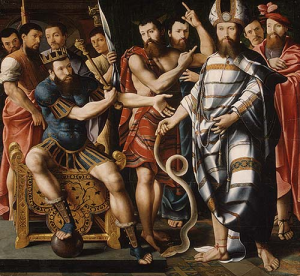“So God heard their groaning, and God remembered His covenant with Abraham, with Isaac, and with Jacob. And God looked upon the children of Israel, and God acknowledged them.” Exodus 2:24-25

Image: http://images.sodahead.com/slideshows/000018393/5240483668_moses_snake-81226511681_xlarge.png
The Bible is filled with promises, but can one trust in them? After all, they were written millennia ago. Many assume that as modern, educated people they have no need for these ancient prophecies. Such assumptions are flat wrong, however, “For the word of God is living and powerful, and sharper than any two-edged sword, piercing even to the division of soul and spirit, and of joints and marrow, and is a discerner of the thoughts and intents of the heart” (Heb. 4:12.) These “living” oracles are still relevant and true, what is more they will be fulfilled, because God is eminently trustworthy. His deliverance of the enslaved sons of Israel provides us with an outstanding example of His faithfulness.
The King Is Dead, Long Live The King
Moses’ forty-year stint as a shepherd, toiling in obscurity in the backside of the desert was coming to an end. He fled to Midian to avoid prosecution and execution for murder – a killing that was intended to alleviate the Israelites’ sufferings. But they did not follow his lead in revolting against the reigning superpower of the ancient Near East. The Pharaoh who pursued his life was now dead and a new man was on the throne. More importantly, as our passage demonstrates, the Lord was well aware of His people Israel’s bondage and sufferings. T. Desmond Alexander notes the connection between the Lord’s and Moses’ common desire to aid Israel: “Thematically it is linked to the preceding section; God, like Moses, cares for the oppressed. Although there have been brief allusions to God’s concern for his people, only now does the narrative reveal in detail his awareness of the Israelites’ suffering: God hears, remembers, sees and knows (24–25).”[i]
The Lord “heard their groaning” – their excruciating pain was not unnoticed by the Almighty.[ii] Their chains were real – as is seen in the repeated use of the word “bondage,” v. 23 – and their prospects for freedom must have seemed exceedingly remote. Nevertheless, He was aware of their need, and had a plan to liberate and bless them. As the New English Translation authors explain: “To say God heard their complaint means that God responded to it. Likewise, the verb זָכַר (zakhar, ‘to remember’) means to begin to act on the basis of what is remembered.”[iii]
Revisiting Old Promises
Not only was the Lord motivated by the Israelites’ immediate situation, He also looked back to the past, referencing the covenant that He made with Abraham, Isaac, and Jacob (v. 24.) Rather than sidetrack His purposes for Israel, the enslavement in Egypt was actually part of the plan, as He told Abraham four centuries earlier (Gen. 15:13-16.) Changing geo-political realities, economic upheavals – even time itself cannot prevent Almighty God from carrying out His will. As the nineteenth-century Bible teacher Edward Dennett declared: “It is impossible that God should forget His word, and if He delay to accomplish it, it is only for the brighter display of His unchanging grace and love.”[iv] Being mindful of His past promises and His people’s present sufferings, the Lord sent a deliverer to rescue them from bondage. Later He led them into the Promised Land. Knowing that He was faithful to Israel in this way – not to mention the hundreds of other fulfilled Old Testament prophecies and types – assures modern people of the Almighty’s commitment to do what He has promised. If you know Him through faith in His Son the Lord Jesus Christ, you may be confident that He will do everything for believers that He has said. As a classic hymn poetically expresses it:
The work which His goodness began,
The arm of His strength will complete;
His promise is Yea and Amen,
And never was forfeited yet.
Things future, nor things that are now,
Not all things below or above,
Can make Him His purpose forego,
Or sever my soul from His love.[v]